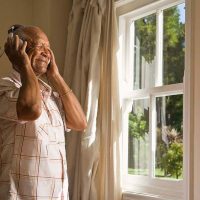November 12, 2025 by Dean Bellefeuille

Dad shuffles a little when he walks, his steps uneven, his balance sometimes shaky. It’s all part and parcel of Parkinson’s disease. But research is revealing a surprising new tool that can help with Parkinson’s walking challenges. And it’s so simple, it can literally be used anywhere, any time. (more…)
November 6, 2025 by Dean Bellefeuille

If you’ve ever tried getting someone with Alzheimer’s ready for a doctor’s appointment, you know it’s rarely as simple as “let’s go.” There are layers of stress: convincing them to put on a coat, handling confusion about why they’re leaving the house, navigating anxiety in the car, and then bracing for the unfamiliar chaos of waiting rooms and fluorescent lights. What should be a simple trip can feel like climbing a mountain. (more…)
October 17, 2025 by Dean Bellefeuille

For many people, a headache is a passing nuisance. A glass of water, a Tylenol or two, or a short nap, and the ache fades into the background. But for someone living with COPD, a headache can feel heavier, more stubborn, and often tied to something deeper than a missed meal or a stressful day. (more…)
October 10, 2025 by Dean Bellefeuille

You’re enjoying a walk with Dad when, without warning, he yells at a passerby or insists on crossing the street at the wrong time. You’re either mortified, terrified, or a combination of both. (more…)
October 3, 2025 by Dean Bellefeuille

When life throws challenges our way, many of us instinctively reach for natural fixes. A squeeze of lemon in hot water can soothe a scratchy throat. A walk in the fresh air can clear a foggy mind. A warm bath can ease tired muscles better than most fancy treatments. (more…)
September 17, 2025 by Dean Bellefeuille

It started with a clear plan: Mom would go to rehab, get stronger, and come home. But then—progress slowed. The days blurred into weeks. A discharge date appeared, then disappeared. And suddenly, words like “long-term stay” or “nursing home” were on the table. Complications after rehab can turn a short recovery into an open-ended question. But here’s the part families often don’t hear: there’s still room to rewrite the ending. (more…)
September 10, 2025 by Dean Bellefeuille

It’s easy to overlook. After all, Dad’s just relaxing in the recliner, watching TV, maybe dozing off here and there. But when sitting becomes the main activity of the day, the risks start stacking up. (more…)
September 3, 2025 by Dean Bellefeuille

You’re doing your best. You show up every day, you try to stay calm, you remind yourself that it’s the disease, not the person. But sometimes, when the same question is asked for the 12th time in an hour, when you’re met with resistance while trying to help, when you haven’t had a full night’s sleep in weeks, something inside you snaps. And then comes the guilt. (more…)
August 19, 2025 by Dean Bellefeuille

You gave your time, your energy, and your heart. You rearranged your life to care for someone you love, and now that they’re gone, you expected to feel grief. What you probably didn’t expect was guilt. Guilt for the things you said. Or didn’t say. For not doing more. Or for feeling relieved that it’s over. Feelings of caregiver guilt after loss can come in waves. Knowing how to process and manage them in a healthy way is an important step toward healing. (more…)
August 12, 2025 by Dean Bellefeuille

Mom likes to talk things through. Dad prefers quick facts. She wants reassurance that everything will be okay. He wants to know he’s still in control. And you? You’re learning that caring for aging parents with different needs often means learning two entirely different “languages.” It may feel like two jobs at once, but understanding what each parent needs emotionally and practically can make the journey more manageable and meaningful. (more…)










